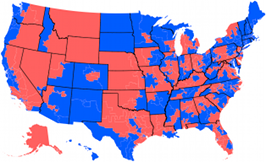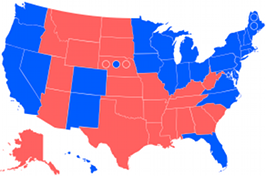Take it or leave it, but PPP polled Kansas, and while I’m sure most of the attention will be on the heated Republican primary for Senate between Pat Roberts and Milton Wolf, the race for governor was actually polled.
That got my attention because it shows Republican Sam Brownback to be losing to Democrat Paul Davis.
[More]
One thing Barack Obama has done very, very well for Democrats is turn out voters. Some Democrats have also learned winning models from his campaigns, including Terry McAuliffe in Virginia.
Michigan Democrats want to do the same, but so far the polls aren’t agreeing with them.
[More]
This is a new feature I’m going to start here at Unlikely Voter. When I see a few polls that aren’t really a whole post in themselves, I’ll throw a post out wrapping them all up into one post.
[More]
For a long time, I was placing myself in the fringe for coming out and questioning Public Policy Polling. Having picked Obama when Obama managed to win was supposed to make them untouchable, no matter how many red flags I saw.
But as with Zogby in 1992, coincidentally being right does not make bad polling fundamentally sound. So I guess it’s now become acceptable, in the post-Obama political age, to begin questioning PPP.
[More]
According to Public Policy Polling, their polling predicted the recall of Angela Giron in Colorado Senate District 3. They then chose not to release the results.
Whether we believe them or not, this doesn’t speak well of the firm.
[More]
Here we go again with Public Policy Polling. They did a poll for the League of Conservation Voters on the 2013 race for Governor in Virginia, and the electorate predicted by PPP is a strange one.
You see, it doesn’t look like Virginia.
[More]
New York Magazine was trying to be sympathetic to the popular polling figures on its own side of the political, but let out a secret in the process: Public Policy Polling cooked the books all along.
[More]
I’m happiest when all the polls in a race match up. It means we have a very good idea of how a race is going for the candidates in it.
So, naturally, I’m not happy about the Massachusetts Senate race right now. Seeing a 10 point swing from poll to poll, giving both candidates opposing 5 point leads, means we have to dig deeper to figure out what’s going on.
[More]
I’m glad that we’re now starting to have a better idea of the shape of the Senate race, as we settle down on who the candidates are going to be, and how they’re polling against incumbents (or each other, in the case of open seats). Soon I will update my Senate projections with actual data.
In the meantime, we’ve got the first Missouri Senate poll in two months. Sarah Steelman polls an absolute majority over incumbent Claire McCaskill.
[More]
Senate polling comes and goes lately, and primary polling is even harder to get. Pollsters seem to get more attention when they make these premature Presidential general election matchups.
But we got some Maine Senate polling from PPP just in time to get wind of some possible machinations in that race. Could Democrats be clearing the way for independent Angus King?
[More]
The Republican party has held five primaries this cycle to date: New Hampshire, South Carolina, Florida, Michigan, and Arizona. Mitt Romney won the statewide vote in four of them, including the last three.
Super Tuesday tomorrow will shake all that up, of course. But Ohio looks to be one state Romney may come back to win from Rick Santorum.
[More]
Last I looked at these two Republican Presidential primaries, the first primaries since Florida and the first binding races since Nevada, I called it Mittmentum.
I was right about Arizona. Michigan though has remained complicated.
[More]
When I left for CPAC, Mitt Romney had just won the Nevada caucuses 50-21 over Newt Gingrich, numbers reasonably in line with the last poll, by Public Policy Polling.
In DC I found out Rick Santorum came out of nowhere and did well in Minnesota, Colorado, and Missouri. Let’s see if the polls caught it.
[More]


 House of Representatives Swingometer
House of Representatives Swingometer Electoral College Swingometer
Electoral College Swingometer